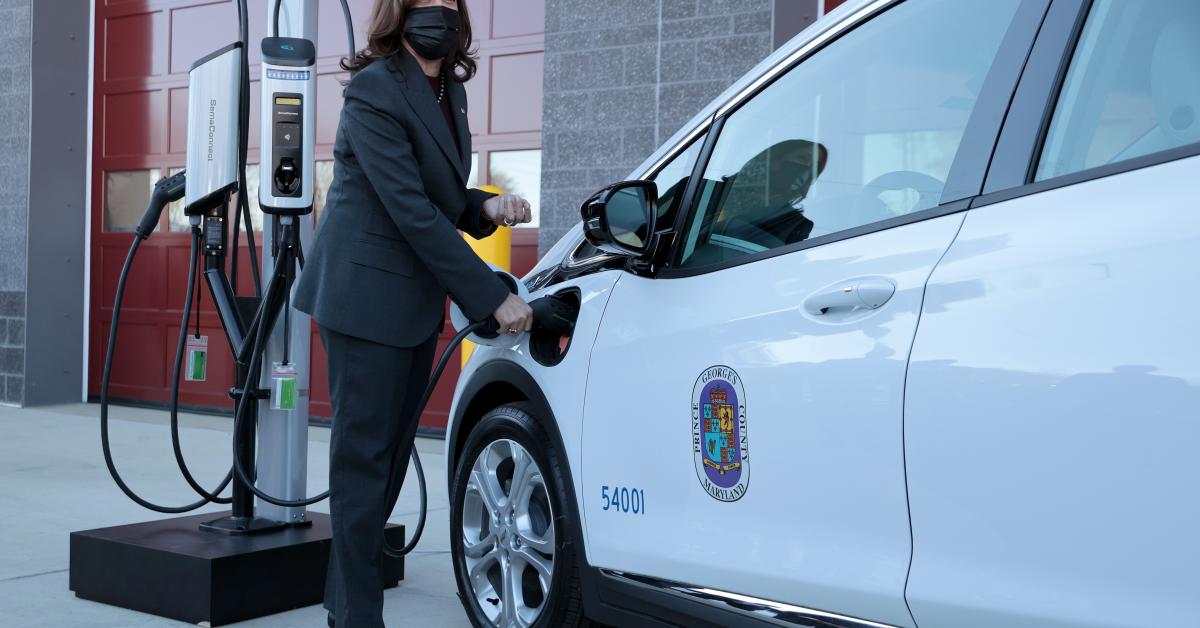We support our Publishers and Content Creators. You can view this story on their website by CLICKING HERE.

During her campaign for president, Vice President Kamala Harris told her supporters in Flint, Michigan, that she would never support an electric vehicle mandate.
“Contrary to what my opponent [Donald Trump] is suggesting, I will never tell you what kind of car you have to drive, but what I will do, I will invest in communities like Flint,” Harris said at a rally in October.
Despite these promises the Biden-Harris administration Wednesday authorized California’s plan to ban the sale of gas-powered cars by 2035. Under California’s law, all vehicles must be “zero emissions,” meaning they cannot be powered by gasoline or diesel. About 20% of plug-in hybrid cars, which have a battery-electric motor that is backed up by a gas-powered engine, will be allowed to be sold.
While Trump has vowed to eliminate the EV mandate, state-level regulations modeled after California’s law could still force Americans into buying EVs despite their interest failing to align with the mandates.
According to the American Fuel & Petrochemical Manufacturers (AFPM), a trade group representing the petrochemical industry, at least a dozen other states have indicated they will follow all or part of California’s law, including Colorado, New York, Massachusetts, New Jersey, and the District of Columbia. All combined, these states hold 35% of the U.S. population.
Despite their interest in following California’s anti-gasoline mandate, none of them are on track to meet California’s 2026 target of 35% sales of EV and plug-in hybrid sales, according to Alliance for Automotive Innovation sales data from the second quarter of this year.
Environmental groups working to block consumers from accessing fossil fuels or products that use them, such as automobiles, praised the EPA’s move.
“This might read like checking a bureaucratic box, but EPA’s approval is a critical step forward in protecting our lungs from pollution and our wallets from the expenses of combustion fuels,” Paul Cort, director of Earthjustice’s “Right to Zero” campaign, said in a statement.
The federal Clean Air Act allows states to set pollution standards stricter than federal requirements, but each state’s proposed regulations have to be approved by the EPA.
“California has longstanding authority to request waivers from EPA to protect its residents from dangerous air pollution coming from mobile sources like cars and trucks. Today’s actions follow through on EPA’s commitment to partner with states to reduce emissions and act on the threat of climate change,” EPA Administrator Michael S. Regan said in a statement.
The AFPM condemned the EPA’s approval, noting the contradiction between Harris’ campaign statements and the greenlighting of California’s ban on gas-powered vehicles. Chet Thompson, president and CEO of the AFPM, said in a statement that he suspects the Biden-Harris administration waited until after the election to issue the decisions.
“These policies will harm consumers—millions of whom don’t even live in California—by taking away their ability to buy new gas cars in their home states and raising vehicle and transportation costs. They will also undermine U.S. energy and national security. Americans want nothing to do with gas car bans, EV mandates or California radicalism, which they just made abundantly clear at the polls,” Thompson said.
Tom Pyle, president of the American Energy Alliance, criticized President Joe Biden and California Gov. Gavin Newsom for putting the interests of “coastal elites” ahead of “working and middle-class American families.”
The Institute for Energy Research, which is the research arm of the American Energy Alliance, produced a report this month on the challenges and complexities of a transition to electric vehicles. The report explains that high upfront costs, charging complexity and expense, barriers to building charging infrastructure, EV depreciation and possible high maintenance costs will continue to impede EV adoption.
“Americans should be free to choose the types of cars and trucks that best suit their needs, not ones that bureaucrats in Washington, D.C. and Sacramento dictate to them. Access to affordable vehicles has helped maintain widespread access to mobility, a cornerstone of American life that has fueled our dynamism for more than a century,” Pyle said in a statement.
According to Axios, the incoming Trump administration will likely overturn the EPA’s waiver, but by authorizing it, the Biden-Harris administration will make it harder for Trump to do so.

 Conservative
Conservative  Search
Search Trending
Trending Current News
Current News 





